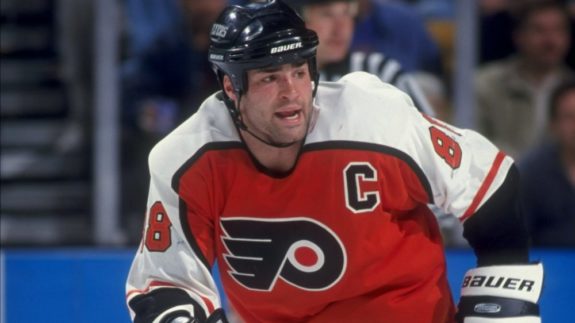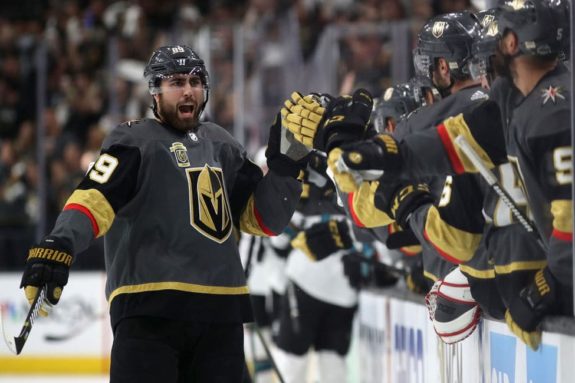The Buffalo Sabres traded Jack Eichel to the Vegas Golden Knights on Thursday. The deal ended a long saga between the player and the organization involving disagreements concerning the treatment of injuries, unfulfilled expectations for the franchise, and the departure of a young star during the prime years of his NHL career. All three elements were also present when the Philadelphia Flyers dealt Eric Lindros to the New York Rangers in August 2001.
Flyers, Sabres Looked for Saviors
Lindros captured as much attention as any prospect ever had when he forced a trade from the Quebec Nordiques after they drafted him first overall in 1991. The Flyers sent a lucrative compensation package for a player who many believed would become on the game’s all-time greats. He immediately inherited the expectation of a savior who could restore the prominence of the organization and bring Stanley Cup glory back to Philadelphia.

The Sabres fell on hard times following their most recent playoff appearance in 2011. They deteriorated into one of the worst teams in the NHL in 2014-15, when the league’s bottom teams shifted their eyes toward two of the best prospects in recent history. The Edmonton Oilers drafted Connor McDavid first overall in the 2015 NHL Entry Draft, and Buffalo selected Eichel second. As a highly-touted American star, Eichel looked like he could lead a resurgence into a new era for one of the best American hockey markets as the centerpiece of their rebuild.
Injuries Stunt Eichel, Lindros
Lindros broke out during the shortened 1994-95 season at age 21 and won the Hart Trophy as league MVP. The Flyers returned to the playoffs after missing in five consecutive seasons and reached the Eastern Conference Final. They reached the Stanley Cup Final in 1997 with Lindros as their captain and dominant centerpiece. His aggressive style added to his outstanding skill level to form one of the most potent all-around players in the history of the NHL when he was at the top of his game.
Injuries tragically impacted Lindros and held him back from maintaining his status as a dominant power forward. He consistently missed time throughout the early years of his career, and concussions became a major concern by the end of the 1999-00 season. He controversially returned from a head injury during the Eastern Conference Final against the New Jersey Devils in 2000. During Game 7, he took a ferocious hit from former New Jersey Devils captain Scott Stevens and fell to the ice on his last shift as a member of the Flyers. He was just 27 years old.
Related: Jack Eichel’s Sabres Tenure Was Disappointing From the Start
Treatment of the concussions led the relationship between Lindros and the Flyers down an ugly path. Former Flyers great Bobby Clarke, who was the general manager from 1994-2006, wanted the Flyers’ captain to return sooner than he was comfortable returning. Lindros’s parents intervened in a way that Les Bowen, formerly of the Philadelphia Inquirer, called “a huge detriment to his (Lindros’s) career” in an “uncomfortable” situation. The superstar center sat out the entire 2000-01 season. Clarke stripped him of the Flyers captaincy and ultimately dealt him during the ensuing offseason.

Eichel developed into a legitimate first-line NHL center over the course of his six seasons in Buffalo. He tallied over a point per game from 2016-17 through 2020-21. However, his talent couldn’t propel the Sabres into relevance. They missed the playoffs in each of the six seasons that Eichel appeared in a game, extending the longest drought in the NHL to 10 years. Many of their best players abandoned Buffalo for more favorable situations. An unceremonious exit for their 25-year-old star center loomed.
Although the lack of organizational success understandably led to frustration, the relationship between Eichel and the Sabres reached a low point because of medical issues. The star center suffered a neck injury in March that required surgery. The Sabres exercised their right to prevent him from choosing his own surgery option. Eichel disagreed with their choice and requested a trade partner who would give him the choice of what surgery he wanted to have. He simplified his stance and his disconnect with general manager Kevyn Adams in an interview with Elliotte Friedman of Sportsnet last week.
“I don’t think someone else should make a decision for me on my body.”
-Jack Eichel
Eichel, Lindros Depart Too Soon
Teams who trade star players during the prime years of their careers will rarely get equal value in return, especially under desperate circumstances. The Flyers acquired Kim Johnsson, Jan Hlaváč, Pavel Brendl, and a third-round pick for Lindros. Johnsson was the only significant long-term piece in the package. He developed into a strong puck-moving defenseman in four seasons in Philadelphia and won the Barry Ashbee Trophy as the team’s top blueliner twice.
Buffalo acquired Alex Tuch, Peyton Krebs, a future first-round pick, and a future second-round pick from Vegas for Eichel and a future third-rounder. Tuch is a solid secondary scorer who could predictably provide comparable value that Johnsson gave to the Flyers. Krebs is a 20-year-old with strong potential that got him the call as a first-round pick in 2019. The Sabres received significantly more draft compensation than Philadelphia did.

Trade packages can only be judged accurately down the road, but it certainly looks like the Sabres got a better return on their disgruntled star than the Flyers did back in 2001. That is especially glaring when considering that Lindros was a significantly better player at his peak than Eichel is right now.
Lasting Legacies
Lindros never regained his form as a standout star after leaving Philadelphia. He played in parts of five more seasons with the Rangers, Toronto Maple Leafs, and Dallas Stars before retiring at just 33, largely due to injury concerns. Eichel would be considered a colossal disappointment in Vegas if he doesn’t exceed Lindros’s production in his final five seasons.
Since his playing career ended, Lindros has spoken about the need for better awareness concerning athletes who suffer concussions. He is one of many people who have helped the public perception of head injuries advance since the time period of his saga in Philadelphia. Friedman noted during his interview that he believes the disagreement between Eichel and the Sabres over surgical options will be “at the forefront of the next negotiations” for the NHL’s collective bargaining agreement in 2026. The progressive understanding of sports injuries through these types of situations is one positive takeaway from the respective situations of these two superstars.
As time passed, the hard feelings between Lindros and the Flyers organization faded. He first played in an alumni game ahead of the 2012 Winter Classic, and he will play in another one next week. The Flyers even retired his number “88” to the rafters at the Wells Fargo Center in 2018. While Eichel surely has raw feelings of resentment, he showed professionalism when he sent out a tweet thanking Buffalo for the positives of the past six years.
Lindros now has his place in the Hockey Hall of Fame, and Eichel hopes to return to the ice in three months and reestablish his game during the prime of his career. Regardless of the ups and downs, the messy blame games, and the controversial handling of injuries, both stars left with a lasting impact of unfulfilled hopes for two passionate NHL fan bases who looked for a star to lead them to a Stanley Cup.
